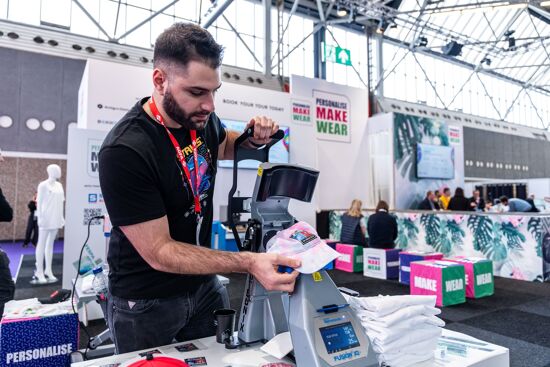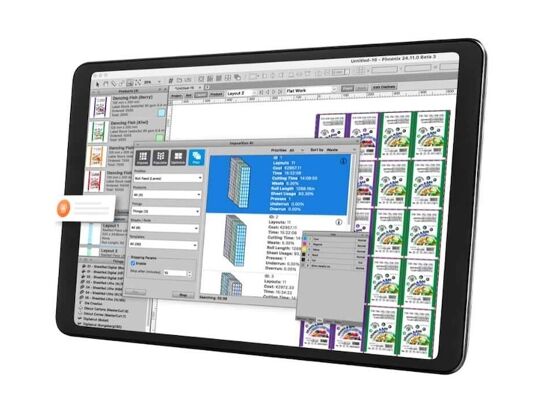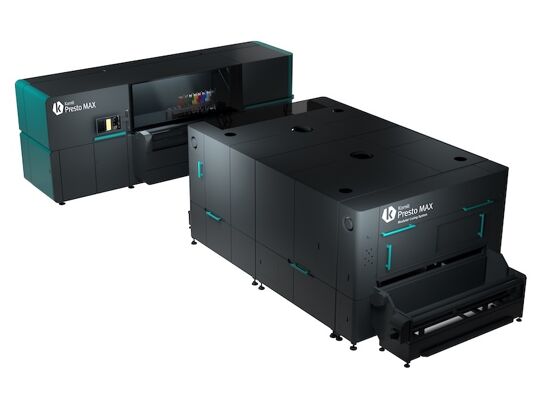MagnaColours launches sustainability standard for textile industry
Ink manufacturer MagnaColours has launched a new eco-friendly standard for water-based inks used in textile printing.
UK-based MagnaColours, a specialist in water-based ink manufacturing, has developed the GNA mark to encourage the use of sustainable and environmentally friendly methods throughout the textile printing industry.
The mark is also designed to reassure consumers who buy printed textiles and apparel that no harmful products have been use in their manufacturing.
Inks and products marked with GNA are guaranteed to be free of harmful chemicals such as PVC and alkylphenol ethoxylates (APEO) and must be water-based formulations.
“There are so many standards on the market from people like Bluesign or Eco Passport, as well as around 50 major retailers that all have different standards, but these don’t work so well for water-based inks,” said MagnaColours executive chairman Tom Abbey.
“At Magna we’ve always tried to lead the industry, and we’re hoping that the development of GNA will continue that work. Textile inks are a high compliance risk and therefore can be a big concern for brands, this standard will bring reassurance to them, as well as their customers."
"GNA is our way of leading the garment printing industry into more sustainable and environmentally friendly practices, and of changing the industry for the better. We wanted to think bigger than our own brand, and the development of GNA really underlines what we stand for.”
He explained that systems like Bluesign and Eco Passport look at production formulas and analyse CAS numbers that relate to individual chemicals. However, water-based printing ink is based mostly on polymers, which do not have CAS numbers and therefore cannot be adequately analysed.
“We analysed some of the certificating systems already in place in the industry such as Bluesign and Eco Passport, and while they are the best standards in place, we felt we could provide one that was more appropriate.”
Abbey explained that MagnaColour's method, which takes place in independent laboratories, tests individual products and can guarantee there is no residual formaldehyde or APEO, for example, in the inks.
The aim, he said was to adhere to the strictest Restricted Substances List (RSL) in printing inks for the textile printing industry globaly, so that GNA compliance results in compliance with all major brand's RSLs as well as other standards such as Eco Passport.
"GNA is not only advantageous for printers, but also retailers and consumers. If more printers comply with this strict environmental standard, then retailers will have more manufacturers to choose from when sourcing their products."
"Consumers also stand to gain peace of mind from GNA, if they see that a product is GNA accredited, they know that it adheres to the most stringent standards," Abbey concluded.
The company said the GNA standard was being market heavily and he anticipated it would be the majority standard for water-based inks globally within 12 months.
For almost two decades, Magna has been at the forefront of the development of water based inks, on a mission to take away the necessity for the use of harmful chemicals, including formaldehyde, in screen-printing. In that time, the demand from consumers for more sustainable products has increased exponentially.
Topics
Interested in joining our community?
Enquire today about joining your local FESPA Association or FESPA Direct
Recent news

Special Effects in DTF Will Make Your “Prints” More Memorable
The DTF market is expanding with new vendors and innovations like multi-head printers enabling diverse ink options (spot, neon). Decorative films offer streamlined special effects. Keypoint Intelligence tested metallic and glitter films, noting varied ease of use and wash durability. New technology using adhesive and foil directly promises further creative advancements in DTF.

SmartHub – Expectations, opportunities and why you should attend!
The SmartHub at Personalisation Experience 2025 in Berlin will showcase personalisation and smart production opportunities across industries like textiles. Featuring a Smart Factory Trail with brands like Inkcups and Trotec, and a conference with experts discussing AI, mass customisation, and profit strategies, it offers insights into reducing waste and boosting efficiency through digital methods. Panel sessions will explore growth, automation in textiles, and smart manufacturing.

How is AI revolutionising Large Format Print?
Nessan Clearly discusses how AI in print relies on data pattern matching, already enhancing software for large format providers. He predicts that this will result in increased AI integration in workflow planning, job queue management, colour correction, image upscaling, and predictive maintenance via sensors and vision systems, ultimately streamlining operations and offering greater flexibility.

One Ink for All? Exploring Pigment in Textile Printing
Digital textile printing faces complexity due to diverse substrates requiring specific inks. The industry seeks a universal ink, with pigment ink showing potential. While traditionally for natural fibres, advancements aim to broaden its application, simplify processes by reducing pre/post-treatment, and improve sustainability, though challenges like hand feel on garments remain.